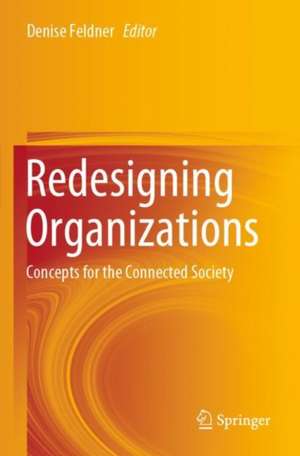Redesigning Organizations: Concepts for the Connected Society
Editat de Denise Feldneren Limba Engleză Paperback – 26 aug 2021
The book explores the challenges and opportunities involved, current and potential future concepts, critical reflections and best practices. It addresses connected societies, new opportunities for governments, the role of trust in digital networks, and future education networks. In turn, a number of representative case studies demonstrate the current state of development in practice.
| Toate formatele și edițiile | Preț | Express |
|---|---|---|
| Paperback (1) | 395.63 lei 6-8 săpt. | |
| Springer International Publishing – 26 aug 2021 | 395.63 lei 6-8 săpt. | |
| Hardback (1) | 512.02 lei 6-8 săpt. | |
| Springer International Publishing – 7 feb 2020 | 512.02 lei 6-8 săpt. |
Preț: 395.63 lei
Nou
Puncte Express: 593
Preț estimativ în valută:
75.71€ • 78.60$ • 63.13£
75.71€ • 78.60$ • 63.13£
Carte tipărită la comandă
Livrare economică 22 martie-05 aprilie
Preluare comenzi: 021 569.72.76
Specificații
ISBN-13: 9783030279592
ISBN-10: 3030279596
Pagini: 384
Ilustrații: XXXIX, 384 p.
Dimensiuni: 155 x 235 mm
Greutate: 0.59 kg
Ediția:1st ed. 2020
Editura: Springer International Publishing
Colecția Springer
Locul publicării:Cham, Switzerland
ISBN-10: 3030279596
Pagini: 384
Ilustrații: XXXIX, 384 p.
Dimensiuni: 155 x 235 mm
Greutate: 0.59 kg
Ediția:1st ed. 2020
Editura: Springer International Publishing
Colecția Springer
Locul publicării:Cham, Switzerland
Cuprins
Part I: "Chapter Zero".- Part II: Case Studies: In Search of Connectivity.- Part III: Case Studies: Governance and Political Risks?.- Part IV: Case Studies: In Tech We Trust?.- Part V: Case Studies: the Future of Education and Work.
Notă biografică
Denise Feldner is an independent innovation manager and IT lawyer. In 2012 she was appointed founding executive director of U15, the association for political lobbying of leading German research universities. She served as deputy representative at the Global Council of Research-Intensive University Networks and headed the presidential team of Heidelberg University. Previously, she was a member of the founding team of the InnovationLab GmbH, a public-private partnership of elite universities and DAX companies. Prior to that, she worked at the international law firm CMS Hasche Sigle, the German Federal Ministry for the Environment, and the Berlin Court of Appeals. Until 2008, she headed the research team of a Berlin law firm focusing on energy law, infrastructures, sustainability and urban planning. Feldner is an invited member of the European Network of the Weizmann Institute, and of the Young European Mission of the Hebrew University, was appointed Young Leader of the Wilton Park Program, the BDI, the German-Russian Young Leaders and the Helmholtz Academy. In addition to her full qualification as a judge, she holds a master's degree in business law for tech companies and completed her management studies at Malik Management, St. Gallen.
Textul de pe ultima copertă
This book offers readers a deeper understanding of the Cyberspace, of how institutions and industries are reinventing themselves, helping them excel in the transition to a fully digitally connected global economy. Though technology plays a key part in this regard, societal acceptance is the most important underlying condition, as it poses pressing challenges that cut across companies, developers, governments and workers.
The book explores the challenges and opportunities involved, current and potential future concepts, critical reflections and best practices. It addresses connected societies, new opportunities for governments, the role of trust in digital networks, and future education networks. In turn, a number of representative case studies demonstrate the current state of development in practice.
The book explores the challenges and opportunities involved, current and potential future concepts, critical reflections and best practices. It addresses connected societies, new opportunities for governments, the role of trust in digital networks, and future education networks. In turn, a number of representative case studies demonstrate the current state of development in practice.
Caracteristici
Addresses the digital transformation in the context of business, government and society Offers valuable insights on the role of trust and new public policy concepts in digital networks Includes case studies on the most recent approaches and projects Addresses the most important questions of being human in the hybrid age
